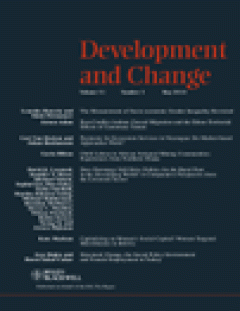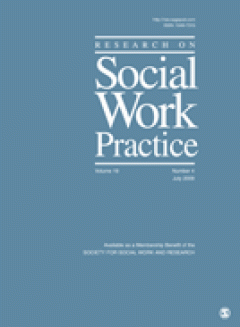Filter by

Modeling Nonprofit Employment: Why Do So Many Lesbians and Gay Men Work for N…
Why are people with same-sex partners more likely than married people to work for nonprofit organizations (NPOs)? Analysis of 2000 Census data suggests that smaller gay�straight pay disparities for men in the nonprofit sector, occupational choices, and ability to afford nonprofit employment explain some overrepresentation of partnered gay men but not of partnered lesbians. Even after controllin…
- Edition
- Vol. 42 no. 6, October 2010.pp. 720-748
- ISBN/ISSN
- 00953997
- Collation
- -
- Series Title
- Administration & Society
- Call Number
- -

The Struggle Continues? The Spectre of Liberation, Memory Politics and ‘War…
Memory politics continues to define the socio-political landscape of post-colonial Namibia. Interpretations of the country's recent political history are used to contest and legitimize current social and political relations. This article examines these issues as they appear in the negotiation of recognition and benefits between ex-combatants and state and ruling party actors. A dominant narrati…
- Edition
- Volume 41, Issue 4, July 2010, pages 589–613
- ISBN/ISSN
- 0012155x
- Collation
- -
- Series Title
- Development and Change
- Call Number
- -

Federal Restructuring in Ethiopia: Renegotiating Identity and Borders along t…
When the Ethiopian state was reorganized as an ethnic federation in the 1990s, both ethnicity and governance experienced the impact of the change. Most importantly, ethnicity became the key instrument regarding entitlement, representation and state organization. For the larger ethnic groups, fitting into the new ethno-federal structure has been relatively straightforward. In contrast, ethnic fe…
- Edition
- Volume 41, Issue 4, July 2010, pages 615–635
- ISBN/ISSN
- 0012155x
- Collation
- -
- Series Title
- Development and Change
- Call Number
- -

Facing Up to the Centre: The Emergence of Regional Elite Associations in Ango…
This article compares two regional elite associations in Angola's southern Hu�la province � the?Associa��o dos Naturais e Amigos de Kuvango, Jamba e Chipindo (Anakujachi � Association of Natives and Friends of Kuvango, Jamba and Chipindo) and the?Associa��o Solidariedade Nyaneka-Humbi (SNH � Nyaneka-Humbi Solidarity Association). It demonstrates how these associations have gained increasing pol…
- Edition
- Volume 41, Issue 4, July 2010, pages 637–658
- ISBN/ISSN
- 0012155x
- Collation
- -
- Series Title
- Development and Change
- Call Number
- -

The People, the Power and the Public Service: Political Identification during…
In francophone West Africa, the term?fonctionnaire unambiguously identifies public servants as integral parts of the state apparatus. Yet during general strikes in Guinea in 2006/7 this self-evident association was called into question by the polarization of the public discourse which forced Guineans into associating either with the state or with the protesting people. Based on empirical data f…
- Edition
- Volume 41, Issue 4, July 2010. pages 659–677
- ISBN/ISSN
- 0012155x
- Collation
- -
- Series Title
- Development and Change
- Call Number
- -

The Party and the State: Frelimo and Social Stratification in Post-socialist …
This contribution examines the relationship between the ruling Frelimo party and the state it controls in post-socialist Mozambique. It argues that while democratic reforms may have altered state structures since the end of single-party socialism in 1992, power remains concentrated in Frelimo, which has actually increased its hold and become more deeply entrenched during the liberal period. The…
- Edition
- Volume 41, Issue 4, July 2010, pages 679–698
- ISBN/ISSN
- 0012155x
- Collation
- -
- Series Title
- Development and Change
- Call Number
- -

Maintenant, on sait qui est qui: Statehood and Political Reconfiguration in N…
The transformation of statehood in the rebel-held northern half of C�te d�Ivoire builds on the reconfiguration of the social and political order. Though the state as an institution has almost ceased to exist, statehood as the practices that refer to it persists. This article examines the negotiations between the different non-state actors and how these interactions shape, through everyday pract…
- Edition
- Volume 41, Issue 4, July 2010, pages 699–722
- ISBN/ISSN
- 0012155x
- Collation
- -
- Series Title
- Development and Change
- Call Number
- -

Negotiating Statehood in a Hybrid Political Order: The Case of Somaliland
This article investigates the negotiation of statehood in Somaliland, a non-recognized?de facto state which emerged from Somalia's conflict and state collapse. The negotiation process centres on the continuing transformation of a hybrid political order, involving �formal� as well as �informal� spheres, both in existing institutions (as �rules of the game�) and in the bodies or agents enforcing …
- Edition
- July 2010, Volume 41, Issue 4, pages 723–746
- ISBN/ISSN
- 0012155x
- Collation
- -
- Series Title
- Development and Change
- Call Number
- -

Researching African Statehood Dynamics: Negotiability and its Limits
A focus on �negotiating statehood� offers an alternative set of lenses on evolving transitions and transformations in African state�society relations to other more teleological perspectives. Notions of �negotiation� and the �negotiability� of authority structures allow recognition of the pliability of emerging state forms and may help in focusing on the dynamic processes through which statehood…
- Edition
- Volume 41, Issue 4, July 2010, pages 747–769
- ISBN/ISSN
- 0012155x
- Collation
- -
- Series Title
- Development and Change
- Call Number
- -

The Strategy for Coastal Sustainability: A Spanish Initiative for ICZM
The Spanish Strategy for Coastal Sustainability (SCS) was an initiative aimed at implementing coastal interventions under the principles of Integrated Coastal Zone Management (ICZM) and improving the state of the coast at the Spanish national level. The SCS, promoted by the Spanish Ministry of the Environment, started as a broad national strategy in 2005 and was finally delivered as a coastal p…
- Edition
- Vol. 38, No. 1, January-February 2010.pp. 76-96
- ISBN/ISSN
- 08920753
- Collation
- -
- Series Title
- Coastal Management
- Call Number
- -

Non-Traditional Security in China-ASEAN Cooperation: The Institutionalization…
The institutionalization of China-ASEAN non-traditional security cooperation is underappreciated, even though its significance should be apparent to Western analysts. Appreciating China-ASEAN non-traditional security cooperation leads to the realization that it has strategic significance, and that the broader China-ASEAN multilateral process is the most institutionally developed expression of E…
- Edition
- Vol. 50, No. 4, July/August 2010, Pages 808–833
- ISBN/ISSN
- 00044687
- Collation
- -
- Series Title
- Asian Survey
- Call Number
- -

Exploring Stakeholder Views Regarding Spatial Information and Enabling Techno…
�Integrated� approaches to coastal management (known as integrated coastal zone management�ICZM) have been adopted widely since the 1992 United Nations Conference on Environment and Development (UNCED). Decision-support for ICZM demands that policy align with practice such that stakeholders can access a range of time-series information across the entire catchment-coastal-marine continuum. Such …
- Edition
- Volume 38, Issue 1 January 2010 , pages 1 - 21
- ISBN/ISSN
- 08920753
- Collation
- -
- Series Title
- Coastal Management
- Call Number
- -

Marine Stingers: Review of an Under-Recognized Global Coastal Management Issue
Dangerous marine stingers (jellyfish) are an emotive issue in tropical Australia, where they are widely regarded as the number one marine health threat. However, numerous severe and fatal stings have been reported throughout the tropical and temperate seas of the world, indicating that marine stingers are a global health problem. Further, life-threatening jellyfish stings are more frequently re…
- Edition
- Volume 38, Issue 1 January 2010 , pages 22 - 41
- ISBN/ISSN
- 08920753
- Collation
- -
- Series Title
- Coastal Management
- Call Number
- -

Coastal Ecosystems and Agricultural Land Use: New Challenges on California's …
This article uses the Central Coast region of California as a case study to examine the challenges of protecting coastal ecosystems near areas of intensive agricultural production. Coastal water quality and biodiversity are greatly impacted by regional land use. Agricultural land use can have significant impacts on water quality through erosion and the runoff of agricultural chemicals. While th…
- Edition
- Volume 38, Issue 1 January 2010 , pages 42 - 64
- ISBN/ISSN
- 08920753
- Collation
- -
- Series Title
- Coastal Management
- Call Number
- -

Estimating a Payment Vehicle for Financing Nourishment of Residential Beaches…
Beach nourishment projects are common methods for coastal states to protect beaches and property from the natural erosive process. However, while the beneficiaries of beach nourishment tend to be local property owners and recreators, projects are typically funded at the state level. Based on the benefit principle, as local residents receive more of the erosion protection benefits of the nourish…
- Edition
- Volume 38, Issue 1 January 2010 , pages 65 - 75
- ISBN/ISSN
- 08920753
- Collation
- -
- Series Title
- Coastal Management
- Call Number
- -

Steps in Intervention Research: Designing and Developing Social Programs
This article describes a 5-step model of intervention research. From lessons learned in our work, we develop an outline of core activities in designing and developing social programs. These include (a) develop problem and program theories; (b) design program materials and measures; (c) confirm and refine program components in efficacy tests; (d) test effectiveness in a variety of practice setti…
- Edition
- Vol. 20 no. 5, September 2010.pp. 459-466
- ISBN/ISSN
- 10497315
- Collation
- -
- Series Title
- Research on Social Work Practice
- Call Number
- -

Depression Care for Low-Income, Minority, Safety Net Clinic Populations With …
Objective: Increasingly, mental health care is provided within the general health care sector. Accompanying this significant change is the demand for evidence-based as well as cost-effective or cost-neutral care models. Method: The authors present a pooled analysis of three large randomized clinical trials in which social workers provide depression care in collaboration with patient navigators,…
- Edition
- Vol. 20 no. 5, September 2010.pp. 467-475
- ISBN/ISSN
- 10497315
- Collation
- -
- Series Title
- Research on Social Work Practice
- Call Number
- -

Culturally Based Intervention Development: The Case of Latino Families Dealin…
Objectives: This article describes the process of developing a culturally based family intervention for Spanish-speaking Latino families with a relative diagnosed with schizophrenia. Method: Our iterative intervention development process was guided by a cultural exchange framework and based on findings from an ethnographic study. We piloted this multifamily group 16-session intervention with 59…
- Edition
- Vol. 20 no. 5,September 2010.pp. 483-492
- ISBN/ISSN
- 10497315
- Collation
- -
- Series Title
- Research on Social Work Practice
- Call Number
- -

Beyond Evidence-Based Practice: Nine Ideal Features of a Mental Health Interv…
Objectives: Recognizing the limitations of conventional frameworks for identifying evidence-based interventions, we sought to develop a comprehensive set of criteria that would have practical and policy relevance. Methods: We identify nine ideal attributes of a mental health practice (well defined, reflecting client goals, consistent with societal goals, effective, minimum side effects, positiv…
- Edition
- Vol. 20 no. 5, September 2010.pp. 493-501
- ISBN/ISSN
- 10497315
- Collation
- -
- Series Title
- Research on Social Work Practice
- Call Number
- -

Preventing Childhood Bullying: Findings and Lessons From the Denver Public Sc…
Twelve-month follow-up outcomes from a group-randomized trial (GRT) of a classroom curriculum aimed at preventing bullying and victimization among elementary students in the Denver, Colorado, public school system are presented. Twenty-eight elementary schools were randomly assigned to receive selected modules of Youth Matters (YM), a skills-training curriculum that targets bullying and victimiz…
- Edition
- Vol. 20 no. 5, September 2010.pp. 509-517
- ISBN/ISSN
- 10497315
- Collation
- -
- Series Title
- Research on Social Work Practice
- Call Number
- -
 Computer Science, Information & General Works
Computer Science, Information & General Works  Philosophy & Psychology
Philosophy & Psychology  Religion
Religion  Social Sciences
Social Sciences  Language
Language  Pure Science
Pure Science  Applied Sciences
Applied Sciences  Art & Recreation
Art & Recreation  Literature
Literature  History & Geography
History & Geography